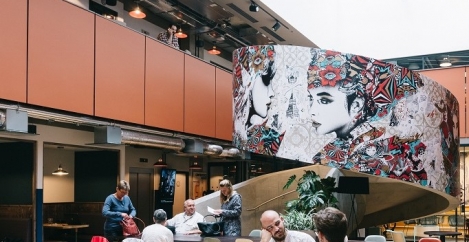September 8, 2021
Landlords and occupiers must work together to meet climate change challenge
 Disruption, cost, building style, individual goals, responsibility and shared space are cited as the key sustainability challenges for the flexible office sector, according to the latest research report from The Instant Group. But while there is still a lot of work to be done in the sector as the role of the workplace evolves, Instant says that flex operators have an opportunity to lead the way in meeting the challenge of climate change. By creating innovative, low-carbon buildings, curating a clear engagement strategy with occupiers and landlords, and ensuring a low-carbon ambition is understood and adopted by everyone, flex operators can be the first to implement highly sustainable workplaces.
Disruption, cost, building style, individual goals, responsibility and shared space are cited as the key sustainability challenges for the flexible office sector, according to the latest research report from The Instant Group. But while there is still a lot of work to be done in the sector as the role of the workplace evolves, Instant says that flex operators have an opportunity to lead the way in meeting the challenge of climate change. By creating innovative, low-carbon buildings, curating a clear engagement strategy with occupiers and landlords, and ensuring a low-carbon ambition is understood and adopted by everyone, flex operators can be the first to implement highly sustainable workplaces.
The research suggests that when it comes to sustainability in the flexible work sector, collaboration between landlords, operators and occupiers is key. Sustainability is often shaped by landlords with ownership allowing greater control around the performance of the building. In the report, several operators reported seeing clients increasingly prioritising addressing climate change in their selection of spaces, driven by their own corporate net-zero ambitions showing that sustainability in the flexible workspace market is no longer a ‘nice-to-have’. The report also found that the buck doesn’t stop there, and that all parties in the real estate supply chain from building and construction to agency and transaction teams are integral in creating net-zero buildings.
As occupiers increasingly set net-zero goals and climate change frameworks into 2030, momentum has been building in the UK flex sector for advanced sustainability programmes and targets. As many leases are signed for a minimum term of 10 years, the ambitions around energy use, such as investment in renewables, provision of energy data, commitments for suppliers, etc., need to be configured in the agreements signed today.
Large occupiers are adopting an increasing amount of flex space within their real estate portfolios and putting sustainability at the forefront of their decision making, for example, setting minimum sustainability standards for the spaces they occupy, including energy operational performance targets and provision of direct renewable energy supplies. Subsequently, the flexible workspace sector has a significant opportunity to support the adoption of sustainability in the operating models of all businesses.
The UK’s Taskforce for Climate-Related Financial Disclosures (TCFD) initiative has put the wheels in rapid motion for mandatory disclosures on climate change and sustainability performance. This all requires sophisticated data management systems and supporting technology. Medium to large occupiers, and increasingly small businesses too, account for their own emissions associated with their business operations.
But emissions associated with their occupation of flex space is often estimated or excluded currently, either because of a lack of data available from operators and/or where emissions are estimated to constitute a small proportion of their overall emissions. As this proportion increases, and disclosure expectations increase, the operators who can provide an accurate view of the environmental impact of a business occupying space in their building will become more and more attractive.
Momentum builds
Sam Pickering, Senior Director, Incendium, said: “Since the signing of the Paris Agreement in 2016, momentum has been building across all industries for businesses to focus on managing and reducing their climate-related risks and impacts. Operators to date have largely been driven by external investors and legislative requirements, but that’s all changing now. People increasingly want to live and work in a way that has minimal environmental impact, and to understand the impacts that are there.
“At the heart of the discussion around sustainability, is the real everyday experience of working in a building – how it looks, how it feels and how it is understood as a space to spend time in. Physical workplaces are key in creating a culture of sustainability for businesses, and operators can aid corporates in achieving this and increasing visibility of their net-zero ambitions for their employees.
“We are seeing progress and making steps in the right direction but more needs to be done. Operators must develop a business model based around the ethos of curating a positive workplace experience, based on collaboration, wellbeing and creating an office environment where people want to be, all with sustainability at the heart. This is just the start of the journey, but with the right drive and innovation, the flex sector can really show the office industry how it can be done.
“Operators are at different stages of evolution, but there is an increasing demand for detailed disclosure on sustainability credentials before occupiers take space, as well as during operation. In flexible office buildings, a large component of this will be developing ways to understand the sustainability performance of heating and cooling systems, lighting systems, granular waste disposal amounts by type and water usage.
“Operators will then be able to give a more accurate picture to occupiers, potential customers and investors as to how the building is being managed and how they are able to work with their occupiers as a collective group to see co-benefits of sustainable operations. Data is, and will increasingly be, critical to complying with legislation as a minimum with sustainability data critical to a company’s financial health and risk management.”













